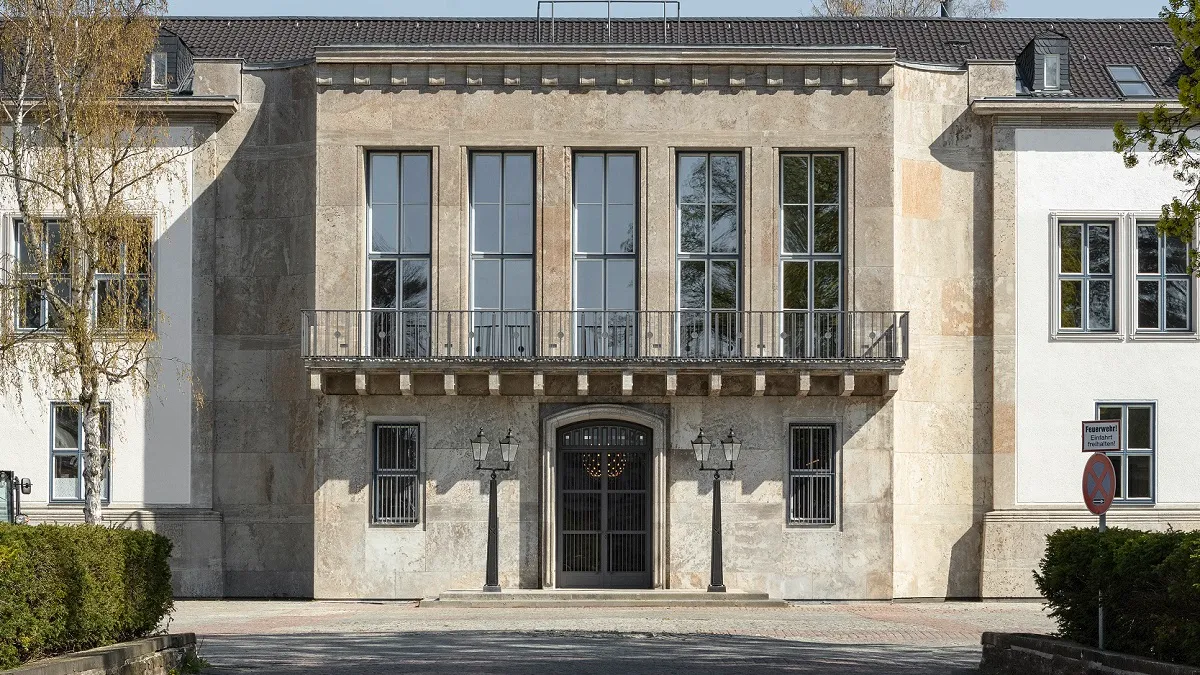
About us
Fluentum is a nonprofit, privately run institution dedicated to exhibiting, producing, and collecting contemporary art, with a special focus on time-based media such as film and video. An initiative of Berlin-based entrepreneur and collector Markus Hannebauer, Fluentum opened its exhibition space in a former military complex in Berlin in 2019. Fluentum’s aim is to elucidate the moving image’s aesthetic, political, and historical dimensions for a public audience.
At the center of its biannual group and solo exhibitions is the realization of new works, which artists develop by Fluentum’s invitation. These works receive their first public presentation at our institution. The exhibitions are complemented by an extensive program of guided tours, artist talks, screenings, and publications, allowing for the exhibition’s content to be extensively explored and discursively expanded. To facilitate accessibility, admission to all exhibitions and events is free of charge.
One of Fluentum’s further priorities is the support of independent artistic practices primarily through funding both artistic productions and external exhibitions. Creating visibility for Berlin-based artists is a special focus of Fluentum’s work. Berlin is unique among cities in the wide-ranging opportunities it offers for the local production of artworks and Fluentum strives to broadly reflect this extraordinary situation in its programming of exhibitions, publications, and new productions.
The Fluentum collection, founded in 2010 by Markus Hannebauer, purchases, archives, and maintains select works of time-based art. Its holdings currently include works by more than sixty artists, representing a range of methods, strategies, and manifestations related to the moving image—from documentary approaches to works immersed in realism to associative experimental films, conceptual video works, and feature-length films. A common thread running through many of the collection’s works is an interest in considering historical material within a contemporary social context and the question of media’s transformation of storytelling. A selection of the works is presented as part of Fluentum’s exhibition program. Upon request, the works in the collection are also made available for external exhibitions and research.
The building
Similar to one of the moving image’s fundamental characteristics—namely, of bringing the past into the present through fictionalizing or reinterpreting it—the building in which Fluentum operates today is a visual marker of history from the present. The building complex, constructed during the Nazi era between 1936 and 1938, was originally called the Luftgaukommando III, based on designs by the architect Fritz Fuß. Initially serving as an administrative building for the German Reichsluftwaffe, from the onset of the Second World War it was increasingly involved in strategic warfare. After the end of the Second World War, and during the near immediate and intensifying Cold War, the U.S. military used the building as its headquarters in West Berlin. The famous Berlin Airlift was organized from here in 1948/49.
During a period of vacancy following the withdrawal of the last GIs in 1994, and the resulting end of its political usage, the complex was repeatedly used as a film set, serving as a supposedly authentic backdrop for historical Hollywood blockbusters, such as Bryan Singer’s Valkyrie (2008) or Quentin Tarantino’s Inglourious Basterds (2009), as well as for local film and television productions. In the early 2010s, a private real estate company purchased the then listed complex, converting the building’s many former office spaces into apartments. In 2016, Markus Hannebauer acquired the ornate main building and commissioned architects Sauerbruch Hutton to transform it into an exhibition space for video art. The outer appearance of the building, sitting on a nearly 5.6-hectare site, has remained virtually unchanged to this day.
Fluentum’s fundamental mission is to work critically and productively with this multilayered historical artifact and its material legacies—both today and in the future. The exhibition venue’s close connection to Berlin’s specific urban history and the site’s cinematic past predestine Fluentum as a unique point of contact for site-specific engagements with history and the role that time-based media plays in understanding it. A dialogical collaboration with artists is at the center of its interdisciplinary conversation, in which artistic methods are treated as being on an equal footing with other forms of research aimed at the development of knowledge. Questions about remembering, dealing with, and confronting historical narratives are repeatedly posed anew in commissioned works, exhibition and program series, publications, and open conversations with visitors—through which history is decidedly understood as a never-ending process.
Fluentum gGmbH
Clayallee 174
14195 Berlin
info@fluentum.org
+49 30 2864 4479
Founding Director:
Markus Hannebauer
Director:
Raoul Klooker
Curatorial Assistant:
Janika Jähnisch
Communication and Outreach:
Katharine Spatz
press@fluentum.org
Exhibition design:
Jörg Adam
A/V technology:
Moritz Hirsch